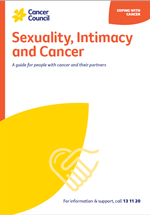- Home
- About Cancer
- Managing side effects
- Sexuality, intimacy and cancer
- Resuming sexual activity after treatment
Resuming sexual activity after treatment
While some people find sexual intimacy is the last thing on their mind during treatment, others say they have an increased need for closeness. An intimate connection with a partner can make you feel loved and supported as you come to terms with the impact of cancer. However, cancer can strain relationships, particularly if you had relationship or intimacy problems before the diagnosis.
Learn more about:
- Overview
- What if I identify as LGBTI?
- Adapting to changes
- What words I should use?
- Communicating with your partner
- Communicating with a new partner
Overview
Sexuality and intimacy after a cancer diagnosis may be different, but this does not mean it will be better or worse. Your preferred sexual positions or activities may become less comfortable temporarily or change over time. It’s natural to feel grief at the loss of your previous sex life or desire. To adapt, you may need to try and be more open to exploring different ways to feel sexual pleasure.
What if I identify as LGBTQI+?
It is important to feel that your sexual orientation and gender identity are respected when discussing how treatment will affect you. Your health care team should openly discuss your sexual needs and support you and your partner throughout treatment.
Coming out as LGBTQI+ to your treatment team is a personal choice. It’s up to you whether you want to share your sexual orientation, preferred pronouns, sex or gender. It may make it easier for you to discuss your sexual health and for your treatment team to give you the most relevant information or connect you to LGBTQI+ support groups.
You can call Cancer Council 13 11 20 to talk through your concerns and ask for information. Your state or territory Cancer Council may also have LGBTQI+ specific resources on their website.
You can contact QLife, a national counselling and referral service for people who are lesbian, gay, bisexual, trans, queer or questioning and/or intersex. Call 1800 184 527 or visit qlife.org.au.
If you have a partner, you can encourage them to come to your appointments. This lets your doctor know who’s important to you and will mean your partner can be included in any discussions.
Before your first appointment, it’s okay to phone or email your doctor to find out if they are LGBTQI+ friendly. You could ask, “My wife will attend the appointment with me, we are both women, will we be welcome at your clinic?” You can ask your GP to include information about you in their referring letter, such as your sexual orientation, or preferred name and pronouns.
Learn more about how cancer and its treatment can affect LGBTQI+ people.
I was deliberately out as gay to my doctor and nurses. They handled it well, acknowledged my husband, and we use joint decision-making in addressing sexual changes.
Simon
→ READ MORE: Adapting to changes
More resources
Dr Margaret McGrath, Head of Discipline: Occupational Therapy, Sydney School of Health Sciences, The University of Sydney, NSW; Yvette Adams, Consumer; Dr Kimberley Allison, Out with Cancer study, Western Sydney University, NSW; Andreea Ardeleanu, Mental Health Accredited Social Worker, Cancer Counselling Service, Canberra Health Service, ACT; Kate Barber, 13 11 20 Consultant, Cancer Council Victoria; Dr Kerrie Clover, Senior Clinical Psychologist, Psycho-Oncology Service, Calvary Mater Newcastle, NSW; Maree Grier, Senior Clinical Psychologist, Royal Brisbane and Women’s Hospital, QLD; Mark Jenkin, Consumer; Bronwyn Jennings, Gynaecology Oncology Clinical Nurse Consultant, Mater Health, QLD; Dr Rosalie Power, Out with Cancer study, Western Sydney University, NSW; Dr Margaret Redelman OAM, Medical Practitioner and Clinical Psychosexual Therapist, Sydney, NSW; Kerry Santoro, Prostate Cancer Specialist Nurse Consultant, Southern Adelaide Local Health Network, SA; Simone Sheridan, Sexual Health Nurse Consultant, Sexual Health Services – Austin Health, Royal Talbot Rehabilitation Centre, VIC; Prof Jane Ussher, Chair, Women’s Heath Psychology and Chief Investigator, Out with Cancer study, Western Sydney University, NSW; Paula Watt, Clinical Psychologist, WOMEN Centre, WA.
View the Cancer Council NSW editorial policy.
View all publications or call 13 11 20 for free printed copies.
Need to talk?
Support services
Coping with cancer?
Speak to a health professional or to someone who has been there, or find a support group or forum
Life after cancer treatment
Webinars, exercise and nutrition, sexuality programs, and back-to-work support
Cancer information
Your coping toolbox
Strategies for managing difficult situations during and after cancer treatment
View our publications
Guides and fact sheets for people with cancer, their families and friends

